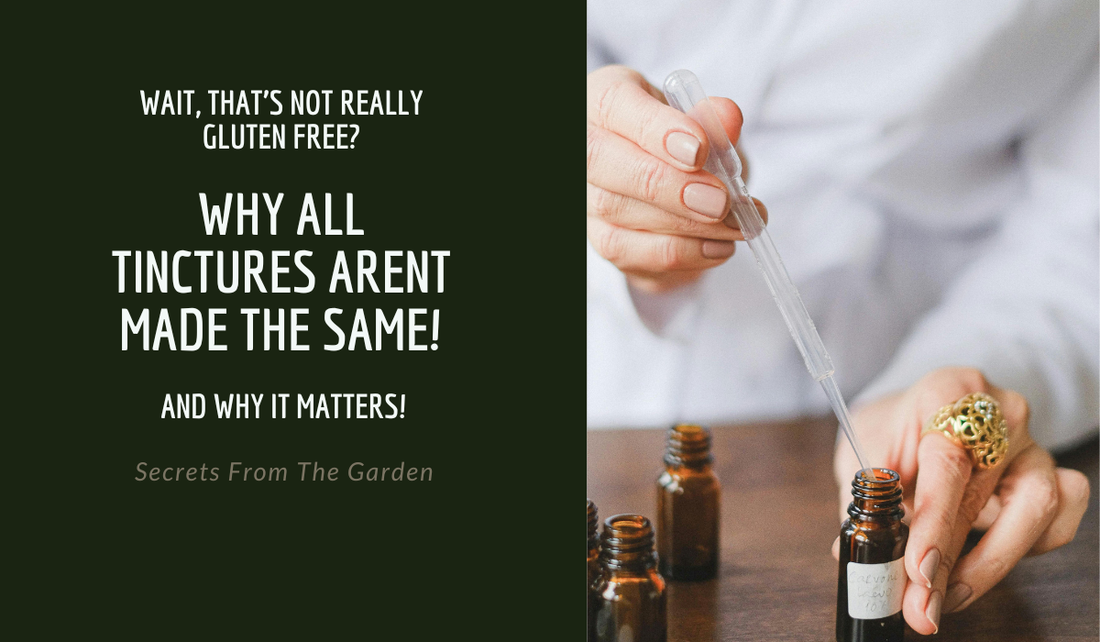
Not All Tinctures Are Made Equally.

What is tincture?
A tincture is a concentrated herbal extract made by soaking plant material in a solvent, most commonly alcohol, to draw out the plant’s active constituents (like alkaloids, flavonoids, or essential oils). It’s a powerful and shelf-stable way to incorporate herbs and their medicinal properties into our lives for general health and wellness.
💧 Common Solvents Used in Tinctures
| Solvent | Notes |
|---|---|
| Alcohol | Most common; extracts a wide range of compounds including alkaloids and preserves well (often 40–60% ethanol) |
| Glycerin | Alcohol-free option (called a glycerite); gentler, sweet taste, shorter shelf life, does not extract all compounds. |
| Vinegar | Used for minerals or certain alkaloids; less common but effective (especially in culinary/herbal vinegars) |

Solvent Origins Matter.
Popular solvent choices in tincture making are rum for its sweetness, and brandy for its deep, rich flavor profile. Again, this is where it gets tricky, because those tinctures are made with grain and will be marketed as gluten free, because of the distillation process. This simple misunderstanding can be a fatal accident waiting to happen.
🥔 Why Potato Vodka Is a Better Choice for Celiac Disease and Gluten Allergies.
As a food allergy mom, this topic is one of my biggest passions! Not all vodka is created equal. Therefore, not all tincture is made equally. Often marketed as gluten free, even though the vodka was distilled from grain.
If you're living with celiac disease or a gluten allergy, you already know how careful you have to be with what you eat and drink. While most people think to avoid bread, pasta, and beer, vodka, alcohol, and therefore, tincture can be a sneaky source of confusion—and potential life-threatening reaction.

🍞 Wait… Isn’t All Vodka Gluten-Free?
Technically, yes. Most vodkas are distilled, a process that should remove gluten proteins—even if the original ingredients (like wheat, rye, or barley) contain gluten.
But for people with celiac disease, non-celiac gluten sensitivity, or wheat allergies, it's not always that simple.
Here's why:
- The distillation process is said to remove gluten, but not all reactions are to gluten proteins alone. Trace contaminants or gluten peptides may still cause reactions to those with celiac disease, or those with severe gluten allergies.
- Cross-contamination: can happen after distillation during bottling or flavoring, especially with flavored vodkas.
- Celiac Disease and Food Allergies: some people who are extremely sensitive to gluten still report digestive or neurological symptoms after drinking grain-based spirits. Even if they are technically "gluten free".

🥔 Why Potato Vodka Is a Safer Bet
Potato vodka is made from—you guessed it—potatoes, which are naturally gluten-free.
That means:
✅ No gluten-containing grains involved at any point
✅ No risk of gluten residue from wheat, barley, or rye
✅ Less chance of triggering a reaction in gluten-sensitive individuals
✅ Rich, smooth taste that’s often favored in craft and premium vodkas
For people with celiac disease or gluten allergies, starting with a gluten-free ingredient (like potatoes) is simply a safer and more trustworthy option when consuming tincture, or when having a cocktail.

✅ Brass Tacks.
If you’re gluten-free for medical reasons, playing it safe matters—especially with alcohol. While grain-based vodkas are often technically gluten-free due to distillation, many sensitive individuals still feel better avoiding them. That is why at Sacred Infusions Apothecary you can rest assured knowing that our tinctures are gluten free from start to finish. Made from 100% non-gmo American grown Idaho Potatoes.
Medical Herbalism- David Hoffman
Principals & Practice of Phytotherapy - Mills & Bone
Advanced Clinical Herbalist Program
Is Vodka Gluten-Free? | BeyondCeliac.org

